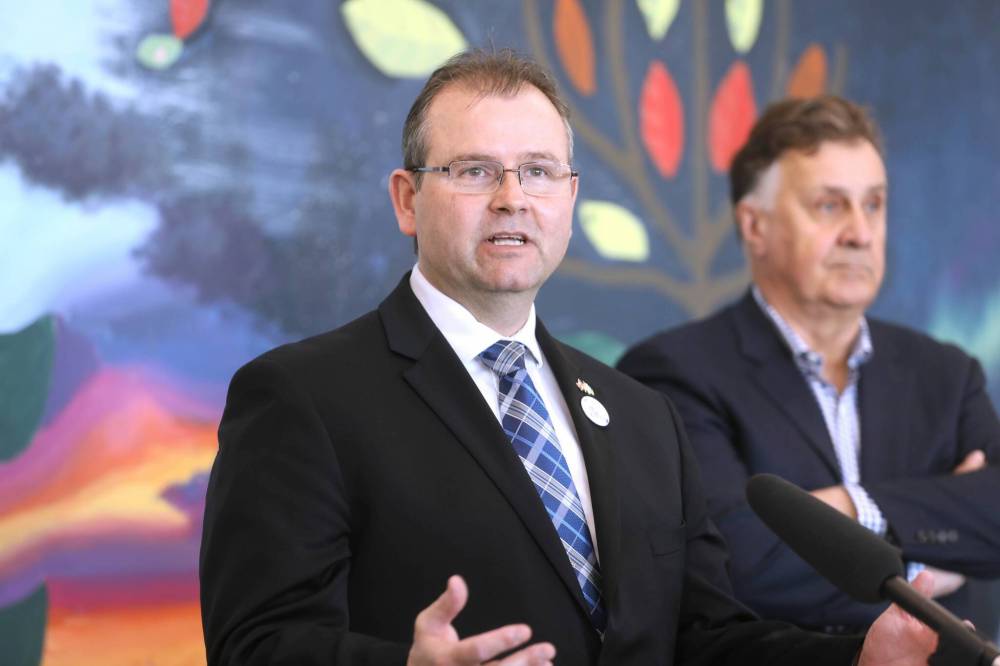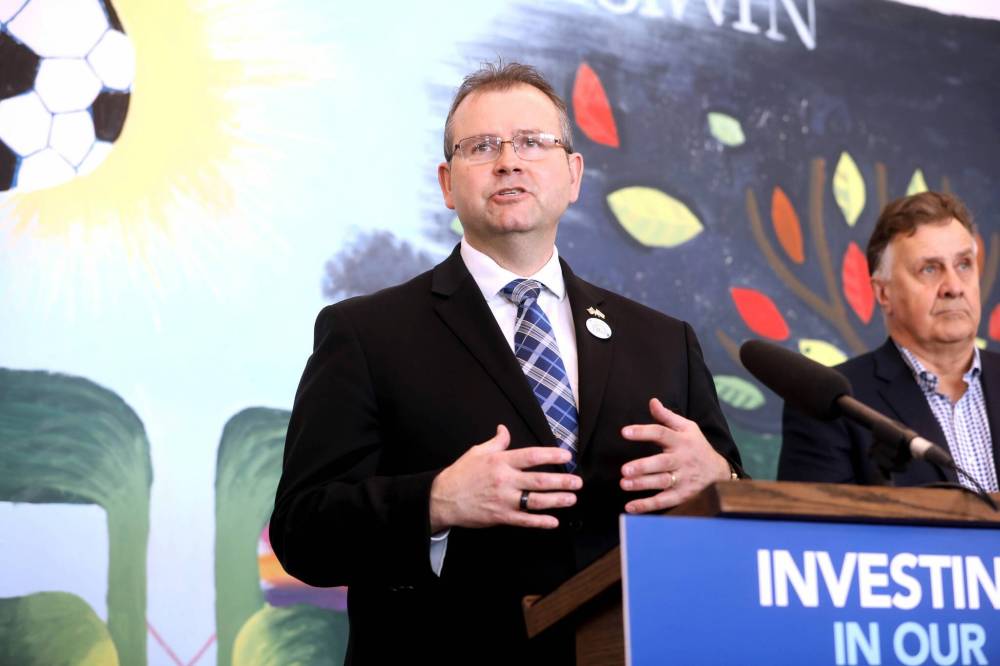Province scraps controversial planks in education reform blueprint
Read this article for free:
or
Already have an account? Log in here »
To continue reading, please subscribe:
Monthly Digital Subscription
$0 for the first 4 weeks*
- Enjoy unlimited reading on winnipegfreepress.com
- Read the E-Edition, our digital replica newspaper
- Access News Break, our award-winning app
- Play interactive puzzles
*No charge for 4 weeks then price increases to the regular rate of $19.00 plus GST every four weeks. Offer available to new and qualified returning subscribers only. Cancel any time.
Monthly Digital Subscription
$4.75/week*
- Enjoy unlimited reading on winnipegfreepress.com
- Read the E-Edition, our digital replica newspaper
- Access News Break, our award-winning app
- Play interactive puzzles
*Billed as $19 plus GST every four weeks. Cancel any time.
To continue reading, please subscribe:
Add Free Press access to your Brandon Sun subscription for only an additional
$1 for the first 4 weeks*
*Your next subscription payment will increase by $1.00 and you will be charged $16.99 plus GST for four weeks. After four weeks, your payment will increase to $23.99 plus GST every four weeks.
Read unlimited articles for free today:
or
Already have an account? Log in here »
Hey there, time traveller!
This article was published 20/04/2022 (1329 days ago), so information in it may no longer be current.
Manitoba’s new road map for K-12 schooling abandons plans to downsize the province’s 37 public school boards, adjust the trustee governance model, and remove principals from the teachers union.
On Wednesday, Education Minister Wayne Ewasko unveiled a five-year strategy that outlines his department’s priorities.
“This action plan redefines our focus on actions that improve educational outcomes, with student achievement and well-being at the centre,” Ewasko said at a news conference at École Templeton in Winnipeg.
“As the actions in the plan are implemented, they will ensure access to: high-quality, equitable education; prepare students for their future; support excellence in teaching and leadership; and strengthen K to 12 education.”
In his opening remarks of the 26-page report, the minister acknowledges public feedback has recently resulted in both a shift to prioritize COVID-19 response planning and the withdrawal of Bill 64 (Education Modernization Act), a widely unpopular reform bill.

The action plan details how Manitoba will respond to all but three of the 75 recommendations put forward by the K-12 commission in its 2020 report, a document that was released alongside the now-defunct Bill 64 and the Better Education Starts Today strategy in March 2021. The pandemic prompted the release of the trio of documents to be delayed by 12 months.
Widespread controversy surrounding Bill 64 — legislation aimed to replace English-language divisions with a centralized education authority run by government appointees — overshadowed the other papers.
Critics, however, were quick to notice the crux of the act differed from the K-12 commission’s proposal to improve school governance.
(The commissioners had called on the province to consolidate boards into six to eight regional entities with boards consisting of both appointed and elected trustees.)
Public outrage about the loss of local voice in education under Bill 64 prompted the province to scrap it at the start of the 2021-22 school year. In her summertime bid to lead the governing party as then-premier Brian Pallister’s popularity plummeted, Heather Stefanson promised to throw out the legislation.
While the province initially accepted the commission’s 75 recommendations “in spirit and principle,” it has since decided to ignore three specific calls to action in light of consultations that have taken place throughout the last year.
The province is ignoring Recommendation 68, a controversial call to consolidate school boards.
“The provincial government appears ready to move forward in a co-governance partnership with school boards, which is exactly how it should be,” said Alan Campbell, president of the Manitoba School Boards Association.
“The provincial government appears ready to move forward in a co-governance partnership with school boards, which is exactly how it should be.” – Alan Campbell, Manitoba School Boards Association
It will also no longer create business manager positions in schools (Recommendation 12) to take over principals’ maintenance and accounting responsibilities or create a new union for school leaders (Recommendation 11), and instead focus on implementing provincial bargaining for all current members of the Manitoba Teachers’ Society.
James Bedford, president of the teachers union, has been outspoken about his concerns about those changes, including fears that moving vice-principals and principals into a different bargaining unit would affect the “collegial working environment” in K-12 buildings and negatively affect learning.
On Wednesday, Bedford indicated the teachers union is pleased with the updated plan — in particular, its reference to mental health initiatives, the role poverty plays in local education outcomes, and the work needed to address achievement gaps between Indigenous and non-Indigenous students.
A commitment to introduce a universal school meal program is missing, he said.

Work is underway to address many of the K-12 commission’s recommendations.
Among recent projects, Manitoba Education has initiated a funding formula review, undertaken research into teacher regulatory body options, and established a curriculum review panel.
The future to-do list includes creating a cyclical curriculum renewal process, making the provincial report card more inclusive, developing a remote learning strategy, establishing a provincial attendance policy, and introducing new summative assessments in early years, middle years, and Grade 10.
A K-12 education council composed of stakeholders is slated to launch later this year to monitor progress. To date, $5 million has been earmarked for action plan projects.
Political opponents criticized the plan, saying little is new — aside from officials backpedalling on contentious items that were part of Bill 64.
Dougald Lamont, leader of the Manitoba Liberals, said urgent needs in the school system related to nutrition, poverty and ventilation continue to go unaddressed.
As far as the NDP’s education critic is concerned, one glaring gap is that there is no post-pandemic plan.
“Right now we’re dealing with the real world issues of long wait lists for diagnostic pieces in education, for psych assessments, kids and the learning impact that the pandemic has had, and no plan from this government to deal with it,” said Nello Altomare, MLA for Transcona.
At the same time, education leaders expressed optimism about the latest announcement marking a new chapter for K-12 schooling, in the wake of Bill 64.

“It’s said that if you want to go somewhere fast, go alone. If you want to go far, go together – and I view the shift in policy by the province as, ‘We’d like to go far, and we’d like to go together,’” said Brian O’Leary, superintendent of the Seven Oaks School Division, at the launch of the action plan.
O’Leary, who made public his concerns about abolishing school boards last year, said he is embracing the idea of everyone working together to achieve better outcomes for all kids.
— with files from Danielle Da Silva
maggie.macintosh@freepress.mb.ca
Twitter: @macintoshmaggie


Maggie Macintosh reports on education for the Winnipeg Free Press. Funding for the Free Press education reporter comes from the Government of Canada through the Local Journalism Initiative.
Our newsroom depends on a growing audience of readers to power our journalism. If you are not a paid reader, please consider becoming a subscriber.
Our newsroom depends on its audience of readers to power our journalism. Thank you for your support.











